
- Homepage
- Author
- Aleister Crowley (10)
- Anonymous (12)
- C H Spurgeon (10)
- Charles Dickens (25)
- Edgar Allan Poe (14)
- God (22)
- John Dee (21)
- John Milton (8)
- L. Frank Baum (10)
- Lewis Carroll (41)
- Louisa May Alcott (10)
- Maria Parloa (9)
- Mixed Authors (11)
- Multiple (8)
- Rudyard Kipling (24)
- Selected (8)
- Unknown (32)
- Various (41)
- Walter Scott (9)
- William Shakespeare (28)
- ... (5066)
- Binding
- Cloth (54)
- Cloth & Boards (2)
- Disbound (3)
- Fine Binding (204)
- Good (8)
- Hardback (115)
- Hardcover (1129)
- Hardcover / (4)
- Hardcover W / Jacket (3)
- Leather (504)
- Leather / Hardcover (4)
- Manuscript (26)
- Manuscript, Unbound (2)
- Original Copy (99)
- Paperback (7)
- Softcover (3)
- Softcover, Wraps (87)
- Spiral (2)
- Vellum (54)
- Very Good (2)
- ... (3107)
- Language
- Subject
- Americana (63)
- Art & Photography (57)
- Children's (183)
- Classic Literature (12)
- Cooking (44)
- Exploration & Travel (51)
- History (278)
- Illustrated (31)
- Law & Government (20)
- Literature (12)
- Literature & Fiction (298)
- Military & War (17)
- Misc (12)
- Outdoor & Nature (15)
- Philosophy (15)
- Poetry (14)
- Reference (52)
- Religion, Bibles (17)
- Science & Medicine (113)
- Sports & Recreation (12)
- ... (4103)
- Topic
- Year Printed
1811 ANTIQUE RARE GETTYSBURG PA US CONSTITUTIONS SIGNED TEXAS NAVY P-Civil War
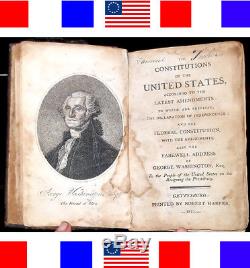
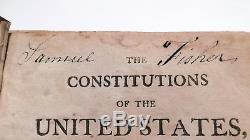
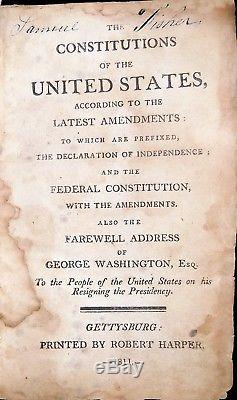
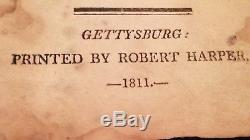
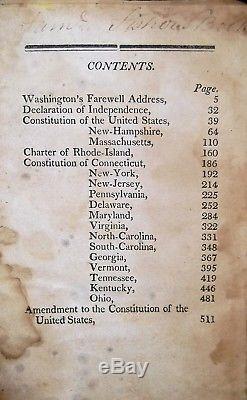
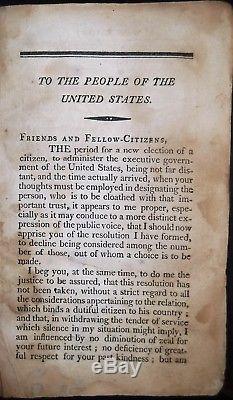
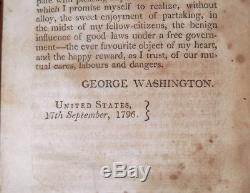
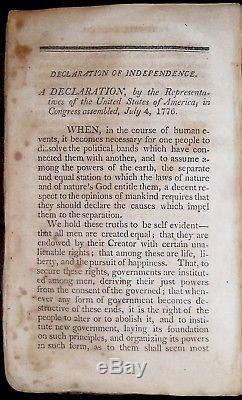
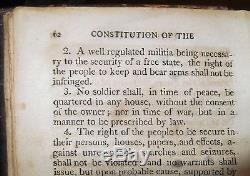
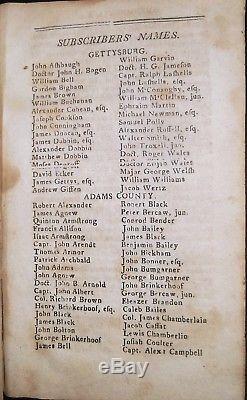
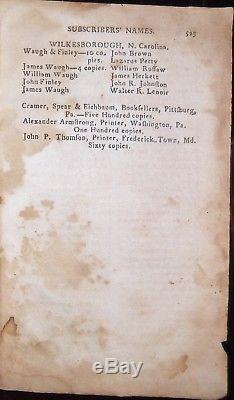
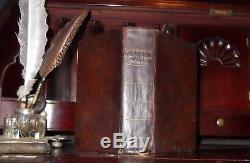


1811 FIRST-EDITION OF: "THE CONSTITUTIONS OF THE UNITED STATES" with THE DECLARATION OF INDEPENDENCE! OWNED AND SIGNED BY SAMUEL FISHER! Printed in Gettysburg, Pennsylvania by Robert Harper, 1811. With its Original Leather Binging, both Original Leather Binding and Original Hinges are Strong and Solid! With various stains and foxing to pages.
Contains 523 printed pages 100% COMPLETE! Signed on Title and Contents page by Samuel Fisher! IMPORTANT NOTE: There were Three (3) "Samuel Fishers" who were born and lived in the Philadelphia area at the time and near where this rare book was printed. All were approx the same age. Samuel Rhoads Fisher, Secretary of the Texas Navy, Born in Philadelphia December 31, 1794, was shot and killed in Texas on March 14, 1839.Samuel Fisher, an American Clergyman (June 30, 1777 1856) born in Massachusetts and didn't live in Philadelphia until the 1830s. Samuel Fisher, a Philadelphia Merchant. But I have priced the book at its value alone not counting the signature since I cannot confirm it.
Samuel Rhoads Fisher was born in 1794 in Philadelphia Pennsylvania approx 110 miles from where this book was printed in Gettysburg, Pennsylvania in 1811. Samuel Rhoads Fisher would have been 17 years old when this book was printed 110 miles from where he lived. Samuel Rhoads Fisher might have signed his name " Samuel Fisher " during his early teen years when he first owned this book and only later in his life would he change his name and signature to S. The Signature of his last name "Fisher" matches EXACTLY his signature on Historic Texas Documents. If somebody can find a Signature of Samuel Rhoads Fisher before 1815 I would appreciate seeing it.Elizabeth Rhoads' parents were Samuel and Sarah Pemberton Rhoads Jr. Samuel Wharton Fisher was the younger brother of Barbara Fisher Burket (born 1742 Philadelphia, PA), grandmother of David Burket and the author's 5th great grandmother. William Fisher was an active city official and shipper in Philadelphia prior to and during the American Revolution. In 1745 he was elected city assessor.
He owned one third of the 70 ton Snow White Oak captained by Charles Lyon who married his cousin Mary. In 1754 and 1755, he was trustee of the new London Coffee House at the corner of Front and Market Streets. In 1767, Fisher was appointed to the Common Council of Philadelphia and in 1771 was manager of the Pennsylvania Hospital.
In 1773 he was elected mayor of Philadelphia. The Fishers originally came to Philadelphia from Ross, Hereford, England around 1700. William and Sarah Coleman Fisher had children Coleman, Barbara, Tabitha, James Cowles, Coleman, Sarah, Rebecca and Samuel Wharton. They had children Elizabeth, Millicent, William, Elizabeth and Thomas. William was born in Ross, Hereford, England and Bridget was from Philadelphia. They had children William, Mary, Sarah, Samuel and Millicent. William Fisher's father of Hereford was also William Fisher of Ross who had wife Mary. In the summer of 1830, Samuel R. Fisher wrote Empresario Stephen F. Austin replied with one of the most eloquent and detailed treatises on his view of the situation expressed in a personal letter. Correspondence between the two men through the fall indicate deep and highly intellectual discussion on the economic and political issues facing Texas. Both exhibited flexibility on the issues and were open to advice and discussion from the other, particularly concerning slavery.Both appeared to abhor the institution in concept, but agreed it may be necessary for a limited time for the timely development of Texas. Fisher even proposed partitioning Texas into regions into slave and non-slave areas. Both men discussed the need to balance the anti-Mexican propaganda in the US newspapers with an explanation of the real situation in Texas so that it would not impair further immigration. Fisher expressed his loyalty to the Mexican government and similar to Austin expressed opinions regarding the potential of Texas to contribute to the development of the Republic of Mexico as a state. In a letter to Austin, he stated.
No vessel can stand this [cost], and unless a change be made the Trade must be abandoned. Bradburn's demand, but Mr. Hiram, and several other gentlemen here say they would not pay it, for Colonel Bradburn has nothing to do with this Colony.According to a letter to Austin of 22 Jan 1832, Fisher arrived with his family on or around that date in Matagorda. Fisher was instrumental in the development of the Matagorda municipality and a protagonist of its development into the key port of Texas. The views and philosophies of Austin and Fisher were quite similar regarding the future of Texas and its potential to be the example of freedom and as asset economically to the United State of Mexico. According to a personal memo in Austin's files, Fisher was a supporter of Austin for the first elected President of the Republic. Although Fisher was appointed Secretary of the Navy under Houston's first presidency, he and Houston were bitter enemies as described further below.
In late 1835 after establishment of the first provisional government of Texas at the consultation of 1835, the means of protection of the Texas coast was a topic of intense discussion. Just as the raising of land forces was done largely through regional and individual initiative, seagoing privateers with their only resources potential spoils obtained through issue of letters of marque was the obvious means in lieu of availability of resources to establish and run an official navy. At one stage blank letters of marque were issued to be filled upon an incident of capture by a particular private vessel against vessels hostile to Texas. In Nov 1835, Brazorians and Matagordans suspected unidentified ships appearing in the gulf as hostile to the Constitution of 1824 and part of the general move by the centralist Santa Anna dictatorship to subjugate Texas along with the rest of the Mexican Republic. The San Felipe under Capt. William Hurd was further armed to investigate and according to a letter from W. Hall to Austin on 23 Nov, was attacked and run aground in Matagorda Bay. According to Hall the vessel William Robbins retrieved the main cannon which was to be moved for the defense of Bexar. The vessel would otherwise operate under Letter of Marque which was issued on 5 Dec.Rhoads Fisher 500; Ira R. 500; Horton & Clements, pr. Agent 500 and George Wheelright 200.
Early in Dec, the American schooner Hannah Elizabeth flying a neutral flag, carrying munitions and supplies destined for Texas, was run aground by the Mexican schooner Bravo at Paso Caballo in Matagorda Bay and boarded by the Mexican crew under Lt. Because of a "norther, " the Bravo was forced to hold offshore at a distance and leave the crew with the wreck. On 19 Dec, under command of Capt.Hurd, the William Robbins manned by volunteers and regulars approached the wrecked Hannah Elizabeth and accepted the surrender of the prize crew from the Bravo without a fight. Under Letter of Marque, Commander of the volunteers Fisher and Capt. Texian military commander of the region, Col. Fannin accused Fisher and Capt. Hurd of appropriating merchandise on the US schooner Hannah Elizabeth which had been run aground by the Mexican vessel Bravo.
Fannin's motives are unclear, but according to Jim Dan Hall in The Texas Navy. All was well until the Texan military commander in that area, Colonel J. Fannin, the illegitimate son of a Georgia planter and who had been known in 1819-21 to the cadets at West Point as J. Walker, decided to deal himself a hand in the game. One would like to believe that he resented the profiteering upon munitions for his troops, but his prior record at Velasco (dealer in slaves with Congo accents) suggests that he wanted a different division of the spoils.
He credited the recovery of the cargo to soldiers-one Somers and two companions, who had, he claimed, virtually recaptured the prize before the Robbins appeared. Fisher was grieved in large part by a message from provisional Gov. Henry Smith sent to the Provisional Council on 16 Dec 1835 and a Council report that supported Fannin.
In Jan 1836, Fisher responded publicly to the charges in great detail and in essence challenged Fannin to a duel which apparently was not accepted. The matter was investigated by a committee of Thomas Barnett, James Collinsworth and Robert H. Williams representing the General Council of the Provisional Government, but apparently was never resolved one way or the other officially.
As late as Dec 1836, Fisher wrote President Lamar commenting on the circumstances surrounding his actions in the event. There were 175 voters at the time in the Matagorda Municipality with voting boxes at Head of Bay Prairie (current Bay City), the home of Francis Keller at Trespalacios (five members of the New Orleans Greys voted here), Matagorda town, Peach Creek District, Elisha Halls District, Thomas McCoys home in the Caney Lower Settlement, Larsches District and the Goliad Municipality.Initial votes for candidates were R. Fisher 79, Bailey Hardeman 75, Ira Ingram 74, Daniel Elam 67, Thomas Cayce 6 and Sanders 1. A large majority of voters were against independence from Mexico, but for an independent state under the Constitution of 1824. On 4 Mar1836, chairman of the committee on privileges and elections, Mr. Your committee on privileges and elections ask leave respectfully to report, that after a patient examination of various documents laid before your committee, in regard to an election held in the municipality of Matagorda, said election being contested by Messrs.
Royall and Fisher have come to the conclusion that Mr. Rhodes Fisher is legally elected and entitled to a seat in this house. The person who discharged that post, appeared before your committee, and testified that he discharged said volunteers on the evening of the 11th and morning of the 12th January, and it appears further in evidence, that a part at least of said volunteers voted again, and your committee are unanimously of opinion, that said votes were not legal votes, and that they ought not to be counted, and in making up their report, they have left them entirely out. It appears further in evidence that three men on their way from the army to the United States, did vote at a house where they stopped for the night, and as is certified, their votes were taken between the hours of 8 and 9 o'clock at night, your committee are unanimously of opinion that the above three votes should not be counted, as they were clearly illegal, and have accordingly thrown them out, as said persons who voted, did immediately thereafter leave the country, and also that the votes were taken after the time of the election. Your committee are therefore of opinion, that Mr. Rhodes Fisher, named, ought to be enrolled among the members of this house. Fisher took his seat on 6 Mar 1836.Minutes of the provisional government on 7 Mar indicated that. Maverick, being absent at the adoption of the Declaration of Independence, asked and obtained leave to sign the same. Rhodes Fisher was also a signatory to the Constitution of the Republic of Texas which was approved at the Convention. On 26 Oct 1836, Fisher was appointed Secretary of the Navy of the Republic of Texas by President Sam Houston and he was confirmed on 28 Oct by the Senate.
William Wharton on a return trip from Washington, DC where unsuccessful negotiations for annexation of Texas were proceeding was captured on the Texas warship Independence by Mexican vessels. Houston refused to sanction an official rescue attempt of Wharton and other Texans taken prisoner. Fisher backed by Congress personally ordered a cruise aimed at pressuring the Mexican government to release the prisoners. In Oct 1837, Houston removed him from office. On 11 Oct, the Senate disapproved the move with the following statement. Wharton offered a substitute for the Resolution introduced on Saturday, directing the President to reinstate the Hon S. Fisher which was received, read and adopted. Mr Wilson entering his protest against the same. Resolved that a committee of two be appointed to wait on his Excellency and inform him that his message of the 6th Instant in regard to the reinstation of the Secretary of the Navy is deemed by the Senate disrespectful, dictatorial and evincive of a disposition on the part of the Executive to annihilate those co-ordinate powers conferred upon the senate by the constitution in all cases of the appointment or removal of Cabinet Officers. The welfare of the country and the respect due to the chief Magistrate greatly dispose the senate to act in concert and harmony with him, but the oath which taken to support the constitution imperatively bind them to prevent their legitimate powers from being infringed by and other department of the Government.They deem the message of his Excellency referred to as an attempt at such infringement and therefore reject and return it with an earnest reiteration of their resolution requesting the reinstation of the Secretary of the Navy or a presentation of the charges which induced his suspension from office. The senate do not deny in toto the power of the Executive to suspend a Cabinet Office, but they conceive that such suspension ought only to be made under very extraordinary circumstances and then that justice to the Individual and respect for the co-ordinate powers of the senate would justify and indeed require an immediate convocation of that body that the suspension might be concurred in or rejected. President of the Senate Mirabeau B. Lamar and Mr Isaac W.
Burton were appointed a committee to wait on his Excellency with the same. On 18 Oct 1837, the Senate ordered Fisher's reinstatement. Fisher replied to the Senate on October 20. Shepherd, a note of which you herewith have a copy; and on the evening of the same day received his reply which is also enclosed. Having now Gentlemen laid before you the facts, and copies of the correspondence in relation to your Resolution, I await the further orders of your Honorable Body. Shepherd replied with the following. In reply to which I beg leave respectfully to remark, that having obtained the appointment which I hold from the Executive, I cannot yield the papers of the Department, without instructions from the same source.On 26 Oct, Houston announced that he was preparing charges against the Secretary and would deliver them to the Senate. The charges were apparently presented to the Senate on 7 Nov, but were never entered in the official records of the Senate.
A Senate trial 23-27 Nov resulted in a vote consenting to Fisher's removal. He was defended unsuccessfully by an eloquent speech on 25 Nov by William H. Wharton which referred to Houston as. The presumed summary of charges appeared years later in the Papers of Mirabeau B. Lamar as a summary in Fisher's handwriting.It was concluded on 28 Nov that. The public good and public policy requires that the President should be permitted to remove the obnoxious Sec. And appoint one with whom he can unite cordially in carrying on the operations of Govt...... But in doing so they must do the Secretary the justice to say that the President has not adduced sufficient evidence that proves him guilty of dishonorable conduct.
A letter to presidential candidate Lamar in Aug 1838 from George Wheelwright urged reconsideration of Fisher for Secretary for the good of the navy and defense of the Republic. This event was a major incident in the early days of the Republic of Texas and added to the severe split between factions in the government. It increased the intensity of Houston's opposition since Fisher was quite popular among the rank and file and the Congress.Samuel Rhoads Fisher was shot and killed in Matagorda on 13 Mar 1839. Albert Newton was charged with the crime.
District attorney for the trial was William L. Delap and William Jones was judge. The jurors were Benjamin J.
Davis, John Delap, Charles Dale, Henry Williams, A. Sam Houston Dixon in Men Who Made Texas Free says that Fisher developed chronic disorder and died January 1839. Dixon in The Men Who Made Texas Free related that. Fisher died, Richard Ellis, who was president of the convention which declared Texas independent of Mexico, said from the floor of the Senate:'In the death of Rhodes Fisher the Republic has lost one of its wisest defenders.He was a man of poise even midst times of stress and excitement. Well do some of us remember his cool and deliberate consideration of our acts at Old Washington, March, 1836; how his voice of caution rang out as men of zeal vied with one another in their precipitous rush to complete their labors of establishing a government and returning to their homes. So earnestly did he plead and so logical was his appeal that we were persuaded to follow his advice........ There was nothing of the braggadocio about him and he did not lack courage to express his opinions. Dixon further related that he was present when Governor E.
Pease, who knew Fisher intimately, related to his son, Rhodes Fisher, of Austin, who was at that time Chief Clerk of the General Land Office under William C. Governor Pease spoke in a reminiscent mood, and among other things said:'I knew your father well. He was usually a very cool-headed man.I never saw him disturbed but once and that was when his seat in the Washington Convention was being contested by a man by the name of Royall who was of a boisterous disposition and talked continually to the delegates about an attempt to cheat him out of his seat. Delegates continued to report to Mr. Fisher what Royall had said. At first he treated these reports with indifference, but he finally became impatient and spoke very emphatic, using some strong language---a cuss word here and there for good measure.
He showed such resentment that he was not disturbed again. The Fishers are buried in the Matagorda Cemetery with State of Texas Historical markers. Fisher County, which was created from Bexar County in 1876, was named in honor of S. Rhodes Fisher, a distinguished officer of the Republic and signer of the Declaration of Independence.
THIS IS A VERY SERIOUS PIECE OF AMERICAN HISTORY!! SEE MY OTHER RARE & VALUABLE EARLY AMERICAN ANTIQUES AND AMERICANA BEING AUCTIONED RIGHT NOW AND MAKE ME AN OFFER! The item "1811 ANTIQUE RARE GETTYSBURG PA US CONSTITUTIONS SIGNED TEXAS NAVY P-Civil War" is in sale since Monday, September 24, 2018. This item is in the category "Books\Antiquarian & Collectible". The seller is "teapartyantiques" and is located in Albuquerque, NM.
This item can be shipped to United States.
- Subject: United States
- Topic: U. Constitutions
- Place of Publication: Gettysburg, Pennsylvania
- Year Printed: 1811
- Binding: Leather
- Special Attributes: Signed
- Language: English
- Country/Region of Manufacture: United States
- Original/Facsimile: Original

